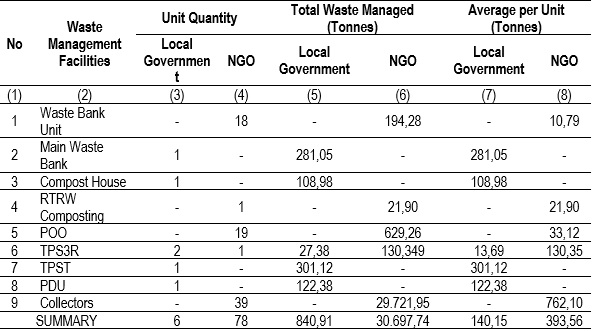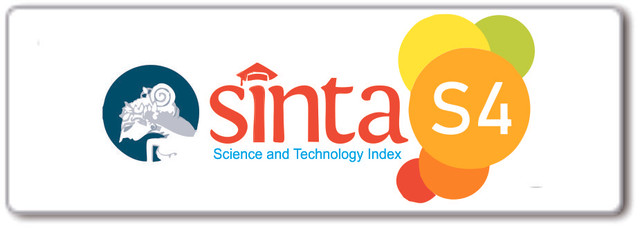Critical Analysis and Performance Optimization of Waste Management Facilities in Pontianak City
Abstract
The rapid population and economic growth in Pontianak City have significantly increased waste generation, yet the capacity of existing waste management infrastructure remains insufficient. This study evaluates the facility requirements necessary for achieving the national waste reduction target of 30% by 2025, as stipulated in Presidential Decree No. 97 of 2017. Utilizing secondary data from SIPSN, the Environmental and Forestry Office, and the Central Statistics Agency, a simple linear regression model was employed to project waste generation from 2023–2025 using SPSS version 22. The results indicate a strong correlation between population growth and waste generation (R² = 0.914), with projected waste reaching 134,606 tons by 2025. A 30% reduction would require the diversion of 40,381 tons. Simulation analysis highlights the need for expanding TPS3R and Waste Bank Units, as well as optimizing current facility capacity. This study recommends strategic investment in infrastructure and operational fleets to meet the 2025 waste reduction target.
Downloads
References
Al-Shetwi, A. Q. (2022). Sustainable development of renewable energy integrated power sector: Trends, environmental impacts, and recent challenges. Science of The Total Environment, 822, 153645. https://doi.org/https://doi.org/10.1016/j.scitotenv.2022.153645
Andeobu, L., Wibowo, S., & Grandhi, S. (2021). A systematic review of E-waste generation and environmental management of Asia Pacific countries. International Journal of Environmental Research and Public Health, 18(17). https://doi.org/10.3390/ijerph18179051
Budihardjo, M. A., Humaira, N. G., Ramadan, B. S., Wahyuningrum, I. F. S., & Huboyo, H. S. (2023). Strategies to reduce greenhouse gas emissions from municipal solid waste management in Indonesia: The case of Semarang City. Alexandria Engineering Journal, 69, 771–783. https://doi.org/10.1016/j.aej.2023.02.029
Burhanuddin, A. D., Yanuwiadi, B., & Asisoesilaningsih, E. (2024). Evaluating Performance and Sustainability of the Waste Bank in Some Cities in East Java Indonesia. J-PAL, 15(2), 77–86. https://doi.org/10.21776/ub.jpal.2024.015.02.03
Harfadli, M. M. arij, Ramadan, B. S., Ulimaz, M., Rachman, I., & Matsumoto, T. (2025). Environmental impact and priority assessment of municipal solid waste management scenarios in Balikpapan City, Indonesia. Cleaner Waste Systems, 10. https://doi.org/10.1016/j.clwas.2025.100223
Kamaruddin, M. A., Norashiddin, F. A., Yusoff, M. S., Hanif, M. H. M., Wang, L. K., & Wang, M.-H. S. (2021). Sanitary Landfill Operation and Management BT - Solid Waste Engineering and Management: Volume 1. In L. K. Wang, M.-H. S. Wang, & Y.-T. Hung (Eds.), Handbook of Environmental Engineering, vol 23.Springer, Cham (pp. 525–575). Springer International Publishing. https://doi.org/10.1007/978-3-030-84180-5_8
Pierini, V. I., Mazzeo, N., Cazenave, M., & Semmartin, M. (2021). Waste generation and pro-environmental behaviors at household level: A citizen science study in Buenos Aires (Argentina). Resources, Conservation and Recycling, 170, 105560. https://doi.org/https://doi.org/10.1016/j.resconrec.2021.105560
Rahmadhani, F., Aziz, R., & Indah, S. (2024). Evaluation of TPS 3R and Waste Bank Management in Sungai Penuh City (Vol. 11, Issue 2). http://cived.ppj.unp.ac.id/index.php/CIVED
Rashid, M. I., & Shahzad, K. (2021). Food waste recycling for compost production and its economic and environmental assessment as circular economy indicators of solid waste management. Journal of Cleaner Production, 317, 128467. https://doi.org/https://doi.org/10.1016/j.jclepro.2021.128467
Royhan, W. S., Sari, K. E., Meidiana, C., Ismail, H., & Aledeh, M. (2023). Measurement of Performance Community-Based Waste Treatment Facility (TPS 3R Saling Asih) Bandung City. Regional and Rural Studies, 1(2), 88–96. https://doi.org/10.21776/rrs.v1i2.20
Seif, R., Salem, F. Z., & Allam, N. K. (2024). E-waste recycled materials as efficient catalysts for renewable energy technologies and better environmental sustainability. In Environment, Development and Sustainability (Vol. 26, Issue 3). Springer Netherlands. https://doi.org/10.1007/s10668-023-02925-7
Suci, A., Widayat, P., Maryanti, S., & Van FC, L. L. (2023). Motivasi Kewirausahaan Sosial Bank Sampah. LPPM Unilak Press.
Wibisono, H., Firdausi, F., & Kusuma, M. E. (2020). Municipal solid waste management in small and metropolitan cities in Indonesia: A review of Surabaya and Mojokerto. IOP Conference Series: Earth and Environmental Science, 447(1). https://doi.org/10.1088/1755-1315/447/1/012050
Zakianis, Z., Fauzia, S., Ayuningtyas, N. V., Firliana, E., Koesoemawardani, P., & Kusnoputranto, H. (2019). KRITERIA PENGELOLAAN SAMPAH DI TPS 3R. Fakultas Kesehatan Masyarakat, Universitas Indonesia

Copyright (c) 2025 Nawawi Nawawi, Maulana Nur, Syafrial Nur

This work is licensed under a Creative Commons Attribution-NonCommercial-ShareAlike 4.0 International License.
Authors who publish with BIOEDUPAT: Pattimura Journal of Biology and Learning agree to the following terms:
- Authors retain copyright and grant the journal right of first publication with the work simultaneously licensed under a Creative Commons Attribution License (CC BY-NC-SA 4.0) that allows others to share the work with an acknowledgment of the work's authorship and initial publication in this journal.
- Authors are able to enter into separate, additional contractual arrangements for the non-exclusive distribution of the journal's published version of the work (e.g., post it to an institutional repository or publish it in a book), with an acknowledgment of its initial publication in this journal.
- Authors are permitted and encouraged to post their work online (e.g., in institutional repositories or on their website) prior to and during the submission process, as it can lead to productive exchanges, as well as earlier and greater citation of published work.








 This work is licensed under a
This work is licensed under a 